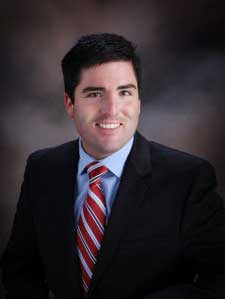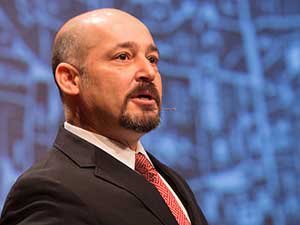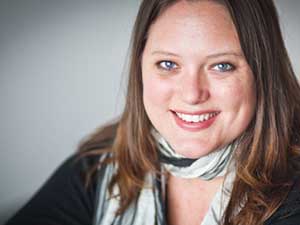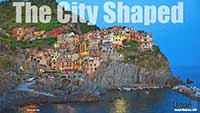After fanning out across downtown Traverse City for sessions on technology, public safety, and more, Convention attendees gathered once again at the Park Place Hotel for Focus Forward, a session designed to offer ideas and insights on the changing role of local government. Three speakers with varying experiences and backgrounds approached the topic from their own unique angle.
 First up was James Freed, Port Huron’s 30-something city manager. Early in his career, in the village of Lakeview, he learned the value of relationship-building. No matter what problems Lakeview was dealing with, chances were good that a nearby community was facing a similar situation. That opened up the opportunity to develop new partnerships with places like Howard City to save money and provide better services to their residents. Those relationships led to shared service agreements for everything from city management and schools to joint purchasing of equipment. They also enabled the village to make key investments in parks and spurred investment downtown.
First up was James Freed, Port Huron’s 30-something city manager. Early in his career, in the village of Lakeview, he learned the value of relationship-building. No matter what problems Lakeview was dealing with, chances were good that a nearby community was facing a similar situation. That opened up the opportunity to develop new partnerships with places like Howard City to save money and provide better services to their residents. Those relationships led to shared service agreements for everything from city management and schools to joint purchasing of equipment. They also enabled the village to make key investments in parks and spurred investment downtown.
Now, as the leader of the city of Port Huron, Freed continues to seek out opportunities to work with other communities for their mutual benefit. He stresses the need to take those local lessons of collaboration into the regional realm for even more impact. The proactive actions communities take in the next five years will define how the next 30 years look.
To build a stronger, more prosperous future for our next generation of citizens, Freed emphasizes the need to make tough decisions now, particularly in regard to paying unfunded liabilities. For every dollar we invest today into paying unfunded liabilities, thats two dollars that young people will have to build their own futures. Freedom doesnt come from governments, says Freed, it comes from the freedom to do business and freedom from the crushing debt of unfunded liabilities. If local government takes the lead on difficult decisions, and their head and heart are in the right place, people will support them.
 Next up was Joe Minicozzi. As principal of Urban3, an Asheville, North Carolina consulting firm specializing in land value economics, tax analysis, and community design, he brings a completely different perspective to the table. He drew an interesting comparison between Rome, New York, where he grew up, and Rome, Italy. In the 1970s, Rome, New York was struggling with the loss of industry, which they tackled by implementing urban renewal projects that virtually decimated the citys downtown. In contrast, Rome, Italy has been around for 2,000 years and is still thriving. He advises community leaders to look carefully at other cities for lessons on what to do or not do for your city to survive.
Next up was Joe Minicozzi. As principal of Urban3, an Asheville, North Carolina consulting firm specializing in land value economics, tax analysis, and community design, he brings a completely different perspective to the table. He drew an interesting comparison between Rome, New York, where he grew up, and Rome, Italy. In the 1970s, Rome, New York was struggling with the loss of industry, which they tackled by implementing urban renewal projects that virtually decimated the citys downtown. In contrast, Rome, Italy has been around for 2,000 years and is still thriving. He advises community leaders to look carefully at other cities for lessons on what to do or not do for your city to survive.
Minicozzi says that when contemplating decisions about your communitys future, you generally have the data you need, you just have to ask the right questions. Very often, the right questions involve land and taxes. Land is your most valuable component, and how you control it is critical. Land is a product, and buildings on the land have a cash flow that varies with the density of development. A Walmart might bring in $6,500 per acre in property taxes, compared with $19, 542 per acre for a house, up to a whopping $634,000 per acre for downtown buildings. This comparison shows the value of urban centers and how taxable values skyrocket as building heights get higher.
Minicozzi stresses the importance of mapping your tax policy and taxable values to see how taxes are affecting your community. Read and understand your tax policy to see how its shaping your city.
 Third on the docket was Claire Nelson, founder of The Urban Consulate, a network of storefront salons for urban dwellers and travelers seeking cross-city exchange. This new endeavor, scheduled to launch in Detroit, New Orleans, and Philadelphia next year, is an outgrowth of Nelsons quality of place and community engagement work in Detroit. She has been involved in everything from leading Urban Innovation Exchange, Open City, and Declare Detroit, to publishing Model D, and now she plans to take the lessons shes learned onto a broader stage with The Urban Consulate project.
Third on the docket was Claire Nelson, founder of The Urban Consulate, a network of storefront salons for urban dwellers and travelers seeking cross-city exchange. This new endeavor, scheduled to launch in Detroit, New Orleans, and Philadelphia next year, is an outgrowth of Nelsons quality of place and community engagement work in Detroit. She has been involved in everything from leading Urban Innovation Exchange, Open City, and Declare Detroit, to publishing Model D, and now she plans to take the lessons shes learned onto a broader stage with The Urban Consulate project.
Nelson says were polite when it comes to planning and designing our communities, but it may be more important to fight for the quality of our place. In fact, making better spaces and places is one of the most patriotic things we can do. Were more alike than different, and we can remind ourselves of that when we bring people together to share each others food, art, music, and culture.
Nelson believes that we are sold the idea that more privacy is better, but really we crave togetherness. We should think of ourselves as an army of people on a mission to create better places, so we all feel a sense of ownership as citizens. She emphasizes the need to push ourselves beyond that first burst of placemaking. Then the question becomes how we can use these places for deeper conversations, involve more people, and build a stronger sense of citizenship. Places can adapt as long as we keep the eye on why a deeper connection with our community.

